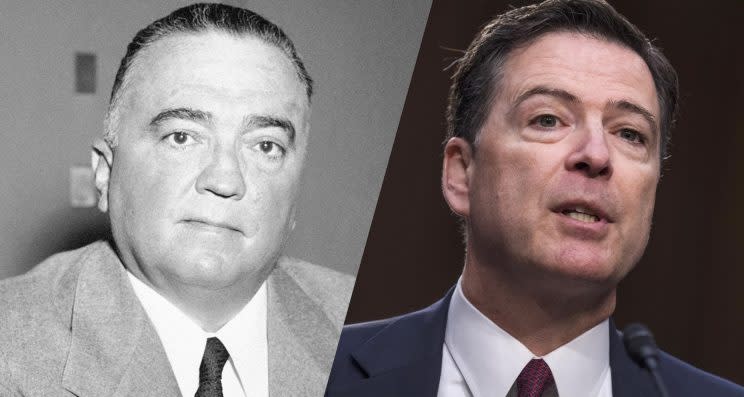Comey on ‘salacious’ Trump dossier: I didn’t want a ‘J. Edgar Hoover’ situation

In Senate testimony Thursday, James Comey explained that he was trying to avoid a “J. Edgar Hoover-type situation” when he first assured Donald Trump that he was not personally under investigation.
During a January meeting at Trump Tower in New York, Comey briefed the president-elect on the existence and circulation of a dossier containing “some salacious and unverified material” on Trump. This was a reference to reports that Russian intelligence had compiled material on Trump that could have been used to blackmail him. A secondhand account of that material was obtained by a private investigator and was subsequently leaked to the media.
Comey told the Senate intelligence committee Thursday that Trump “had a strong and defensive reaction about that not being true.” In his prepared testimony, released Wednesday, the former FBI director noted that Trump referred to one of the allegations in the dossier again during a call on March 30, telling Comey that he “had not been involved with hookers in Russia.”
Trump’s reaction at the January meeting led Comey to conclude “it was important for me to assure him we were not personally investigating him.”
Related slideshow: James Comey testifies at Senate hearing >>>
Comey went on to explain: “I was worried very much about being in kind of a J. Edgar Hoover-type situation,” referring to the first FBI director, who reportedly kept files of potentially compromising material on elected officials for his private use.
“I didn’t want him thinking that I was briefing him on this to sort of hang it over him in some way,” said Comey. “I was briefing him on it because we had been told by the media it was about to launch, we don’t want to be keeping that from him. … He needed to know this was being said.”
But, he continued, “I was very keen not to leave him with an impression that the bureau was trying to do something to him, and so that’s the context in which I said: ‘sir, we’re not personally investigating you.’”
Read more from Yahoo News:



